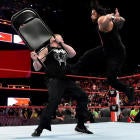Part of the magic of professional wrestling has always rested in the so-called "finishing maneuver." Hulk Hogan's leg drop, The Undertaker's "Tombstone Piledriver," Steve Austin's "Stone Cold Stunner" and John Cena's "Attitude Adjustment" are just a few of the most notable finishers that -- once you saw them hit in the center of the ring -- signaled the likely end to a match and a victory for the hero or villain.
Nowadays, finishers in WWE have gone the way of Cena himself: They're hanging around and can be effective in storytelling, but the emphasis and impact of them have been wasted by the company's booking.
The paradigm of WWE's stance on finishing maneuvers is the dual storylines that have consumed the Raw brand since the day after WrestleMania 33. As WWE builds toward what all expect to be Brock Lesnar defending his universal title against Roman Reigns at WrestleMania 34, two storylines that have emerged are headed toward a collision. Will Lesnar's F5 be enough to put away Reigns, or will Reigns become the first superstar to successfully kick out of Lesnar's finisher this season?
WWE wants you to forget, of course, that one F5 was not enough to end Goldberg's miraculous return a year ago. Cena, Taker and others had previously been survivors of the finisher, though they eventually succumbed to subsequent attempts. Since that 'Mania title win over Goldberg nearly nine months ago, Lesnar has wrestled just five times and defended his title four times in televised events: Samoa Joe (Great Balls of Fire), Reigns (SummerSlam, in a Fatal 4-Way match), Braun Strowman (No Mercy), AJ Styles (Survivor Series) and Kane (Royal Rumble) have all eaten the F5 and taken a pinfall.
While Lesnar has wrestled a total of 47:35 on the WWE Network since that Goldberg match at WrestleMania 34, Reigns as a full-time superstar has been on the grind. He's suffered plenty of big-match losses along the way to Lesnar, Strowman, The Miz and Seth Rollins -- WWE protected him from such defeats in the past -- but none came easy. And over the last two years, but especially as of late, Reigns has made it his business to power out of even the best finishers WWE has to offer: Randy Orton's RKO, Sheamus' Brogue Kick, Bray Wyatt's Sister Abigail, Strowman's running powerslam, Triple H's Pedigree, Seth Rollins' Pedigree, Styles' Styles Clash, Taker's Tombstone and Cena's AA. Oh, and he previously kicked out of Lesnar's F5, but that was back at WrestleMania 31 before Rollins cashed in his briefcase (lest you forget).
Big fan of WWE? Be sure to subscribe to my podcast In This Corner with Brian Campbell where I break down everything you need to know each week.
This is effective storytelling by WWE, and the video packages leading into an assumed Lesnar-Reigns match should be tremendous, particularly considering their WrestleMania 31 duel never had a decisive winner due to Rollins' interference. But outside of Lesnar and Reigns, the pedestal WWE once held its finishing maneuvers on is being drastically lowered, and the brand is worse off for it.
WWE long ago "ruined" Cena's AA by allowing basically every major superstar to kick out of the maneuver, either forcing him to hit it a second time, necessitating him to move to the "Super AA" (off the second rope), or making Cena lock in his STF submission move in order to finish a match. In fact, Cena has seen a superstar kick out of his AA in three straight weeks on Raw, twice being forced use the "Super AA" to defeat Finn Balor and The Miz in singles matches on Monday nights.
Even putting aside the diminishing effect of some finishers, WWE has gotten to the point where it has stopped bothering even naming them or putting them over on commentary to help its superstars. And while it will occasionally happen where a superstar debuts a new finisher and it takes a couple of weeks to find that perfect name, now it is just being forgotten.
Strowman's running powerslam is nameless. So too is the combination White Noise / diving neckbreaker used by WWE's multi-time tag team champions in The Bar. Chad Gable & Shelton Benjamin don't have a tag team name let alone a pseudonym for their powerbomb diving clothesline.
Seth Rollins moved from the Curb Stomp to The Pedigree to a ripcord high knee that he used for the better part of a year; it was called King's Landing for one week, then briefly "the knee," then it was hardly referred to again until Monday when (now as a secondary move) it was called the Revolution Knee out of the blue. A couple weeks ago, when that was trashed as Rollins' finisher, the Curb Stomp returned to fans' delight as the more-PC named Blackout … but after a few weeks of that, Michael Cole referred to it as "The Stomp" on Monday night.
Still with me?
Alexa Bliss used to have Twisted Bliss; now she has a snap DDT without a name, and she's spent nearly her entire main roster career as women's champion. Asuka's tremendous Asuka Lock was dropped for some reason, and she now uses a nameless armbar. Nia Jax should be a dominant performer, but she wins 20 percent of her matches; creative cannot decide on a finisher for her, let alone a name for one with her fireman's carry powerslam, standing leg drop, pop-up Samoan drop and running somersault senton all being used randomly and sometimes ineffectively.
WWE redebuted Luke Harper & Erick Rowan as the Bludgeon Brothers, a decent enough gimmick with an impressive unnamed double crucifix powerbomb finisher. Mojo Rawley used to use Hyper Drive, now he runs his forearm into a cornered opponent. Carmella used to have the Mella Buster and Code of Silence, now she just hits a superkick. The same goes for Dolph Ziggler, whose Zig Zag was a unique and effective finisher until it became a secondary move in his arsenal.
If these were all undercarders young in the business and working their way up, that would be one thing. But these are some of WWE's champions, title competitors and featured performers.
A great, recognizable, effective finisher is one of the easiest tropes WWE can use to get a superstar over. Think back to the Tombstone, Stunner, Sharpshooter, 3D, among many others. In fact, I didn't even have to put names next to those final two finishers and you know they were executed by Bret Hart and The Dudley Boyz, respectively.
WWE ensuring its announcers put over those moves in a strong manner is just as important. See Corey Graves and Shinsuke Nakamura's Kinshasa as a perfect example. As an international yet highly-acclaimed talent in NXT, Nakamura already had the fans behind him, but the brand quickly established that his Kinshasa was a devastating finisher with Graves putting over the move extremely well on commentary every time Nakamura landed it.
While a variety of other issues contributed to Nakamura's struggles since his debut on the main roster -- that's a whole story onto itself -- the fact that his Kinshasa was treated just like any other finishing maneuver did little to help. WWE moving Graves to the SmackDown Live broadcast was an improvement for the entire show, but Nakamura certainly benefited once again with someone on the mic selling his devastating finisher.
Don't get me wrong: Finishers are not the end-all, be-all of getting a superstar over these days. It ultimately starts with consistent booking and actually listening to fans, areas in which WWE struggled significantly in 2017. But they are absolutely a tool to solidify stars and build them up as formidable forces and legitimate contenders, something WWE is not using nearly as well as it used to.
So when word gets out that WWE wants to merge branded pay-per-views into supershows because they are sick of repetitive matches and are finding it difficult to book brands over long periods of time, just remember it's doing it to itself and attempting to rectify a problem created internally. It is WWE's fault it is choosing not to establish more legitimate title-winning stars and failing to use one of its most basic booking strategies to accomplish that task.





















